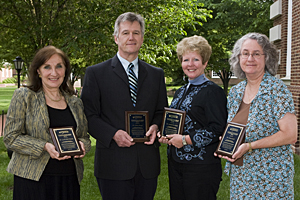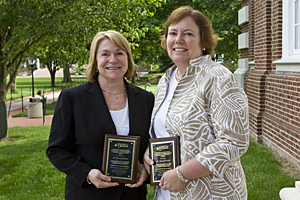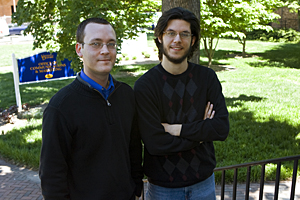

ADVERTISEMENT
- Rozovsky wins prestigious NSF Early Career Award
- UD students meet alumni, experience 'closing bell' at NYSE
- Newark Police seek assistance in identifying suspects in robbery
- Rivlin says bipartisan budget action, stronger budget rules key to reversing debt
- Stink bugs shouldn't pose problem until late summer
- Gao to honor Placido Domingo in Washington performance
- Adopt-A-Highway project keeps Lewes road clean
- WVUD's Radiothon fundraiser runs April 1-10
- W.D. Snodgrass Symposium to honor Pulitzer winner
- New guide helps cancer patients manage symptoms
- UD in the News, March 25, 2011
- For the Record, March 25, 2011
- Public opinion expert discusses world views of U.S. in Global Agenda series
- Congressional delegation, dean laud Center for Community Research and Service program
- Center for Political Communication sets symposium on politics, entertainment
- Students work to raise funds, awareness of domestic violence
- Equestrian team wins regional championship in Western riding
- Markell, Harker stress importance of agriculture to Delaware's economy
- Carol A. Ammon MBA Case Competition winners announced
- Prof presents blood-clotting studies at Gordon Research Conference
- Sexual Assault Awareness Month events, programs announced
- Stay connected with Sea Grant, CEOE e-newsletter
- A message to UD regarding the tragedy in Japan
- More News >>
- March 31-May 14: REP stages Neil Simon's 'The Good Doctor'
- April 2: Newark plans annual 'wine and dine'
- April 5: Expert perspective on U.S. health care
- April 5: Comedian Ace Guillen to visit Scrounge
- April 6, May 4: School of Nursing sponsors research lecture series
- April 6-May 4: Confucius Institute presents Chinese Film Series on Wednesdays
- April 6: IPCC's Pachauri to discuss sustainable development in DENIN Dialogue Series
- April 7: 'WVUDstock' radiothon concert announced
- April 8: English Language Institute presents 'Arts in Translation'
- April 9: Green and Healthy Living Expo planned at The Bob
- April 9: Center for Political Communication to host Onion editor
- April 10: Alumni Easter Egg-stravaganza planned
- April 11: CDS session to focus on visual assistive technologies
- April 12: T.J. Stiles to speak at UDLA annual dinner
- April 15, 16: Annual UD push lawnmower tune-up scheduled
- April 15, 16: Master Players series presents iMusic 4, China Magpie
- April 15, 16: Delaware Symphony, UD chorus to perform Mahler work
- April 18: Former NFL Coach Bill Cowher featured in UD Speaks
- April 21-24: Sesame Street Live brings Elmo and friends to The Bob
- April 30: Save the date for Ag Day 2011 at UD
- April 30: Symposium to consider 'Frontiers at the Chemistry-Biology Interface'
- April 30-May 1: Relay for Life set at Delaware Field House
- May 4: Delaware Membrane Protein Symposium announced
- May 5: Northwestern University's Leon Keer to deliver Kerr lecture
- May 7: Women's volleyball team to host second annual Spring Fling
- Through May 3: SPPA announces speakers for 10th annual lecture series
- Through May 4: Global Agenda sees U.S. through others' eyes; World Bank president to speak
- Through May 4: 'Research on Race, Ethnicity, Culture' topic of series
- Through May 9: Black American Studies announces lecture series
- Through May 11: 'Challenges in Jewish Culture' lecture series announced
- Through May 11: Area Studies research featured in speaker series
- Through June 5: 'Andy Warhol: Behind the Camera' on view in Old College Gallery
- Through July 15: 'Bodyscapes' on view at Mechanical Hall Gallery
- More What's Happening >>
- UD calendar >>
- Middle States evaluation team on campus April 5
- Phipps named HR Liaison of the Quarter
- Senior wins iPad for participating in assessment study
- April 19: Procurement Services schedules information sessions
- UD Bookstore announces spring break hours
- HealthyU Wellness Program encourages employees to 'Step into Spring'
- April 8-29: Faculty roundtable series considers student engagement
- GRE is changing; learn more at April 15 info session
- April 30: UD Evening with Blue Rocks set for employees
- Morris Library to be open 24/7 during final exams
- More Campus FYI >>
3:53 p.m., May 24, 2010----Six University of Delaware faculty members have received awards in recognition of their outstanding work in teaching and advising. Two teaching assistants also have received awards for excellence. The awards were announced at the May meeting of the Faculty Senate.
Excellence in Teaching Awards
Four faculty members won Excellence in Teaching Awards, which are based primarily on student evaluations. Each winner will receive $5,000, have his or her portrait hung in Morris Library for five years and have a brick, inscribed with his or her name, installed in UD's Mentors' Circle.
This year's Excellence in Teaching Awards were presented to Susan Groh, assistant professor of chemistry and biochemistry, James Magee, professor of political science and international relations, Judith Herrman, an associate professor in the School of Nursing, and Gabriella Finizio, assistant professor of foreign languages and literatures.
Susan Groh, who received her doctorate in chemistry from Stanford University, joined the University of Delaware faculty in 1984. Her interests in the area of chemical education center on the application of problem-based learning in undergraduate education, particularly in general chemistry.
Groh said she believes the most important aspect of the student-teacher relationship is trust. “Students should be able to trust that an instructor has their best interests in mind, and has structured a course to give them multiple opportunities to develop their knowledge and skills as learners,” she said. “An instructor should be able to trust that students take their charge as learners seriously, and are really making an effort to master the ideas and skills developed in a course.”
Groh, who teaches first year students, said she tries to challenge her students, but that she understands how the level of education between high school and college can be vastly different.
“These are also students who may not have been particularly challenged in high school, and making the transition to university-level expectations is often more difficult than they had anticipated,” she said. “I try to push students to go beyond what they thought were their limits while remaining sensitive to the disequilibrium this may create. It's very satisfying to see the growth in students, even over a single year, as they make that adjustment and develop an increased sense of confidence in their own abilities.”
James Magee, professor of political science and international relations, received his doctorate from the University of Virginia in 1975 and joined the UD faculty one year later. Magee specializes in public law, emphasizing American Constitutional law and the Supreme Court.
“This one is special because, having received this award twice before, receiving it again this late in my career makes me feel that I remain a respected and effective classroom instructor who can inspire (most of my) students to do their best,” Magee said.
In his role as teacher, Magee said he wants to convince his students to “think critically, conceptually and analytically -- and this requires face-to-face, in-class and out-of-class, interaction with students. The objective is to build confidence that encourages students to do their best work, to think for themselves, to convince them that they can reach a level of thinking and learning that transcends memorizing information they will forget soon after the course is finished.”
Judith Herrman, associate professor in the School of Nursing who received her bachelor's, master's and doctoral degrees from the University of Delaware, studies public policy and health, teen pregnancy and sexual behaviors, diabetes and pediatric chronic illness, and creative teaching strategies.
To Herrman, the most important aspect of the student-teacher dynamic is “the relationship itself -- getting to know students and helping them learn to learn, setting up the resources and environment so they learn to teach themselves. I believe that is the essence of education.”
Herrman said she enjoys watching the “lightbulb go on” and that she is “proud to join the ranks of others who have received this award. I think teaching and being a professor is a wonderful opportunity to guide the next generation and feel fortunate to be able to do this every day. This award reaffirms what I love about teaching.”
Gabriella Finizio, who earned her doctorate at Middlebury College, focuses her work on 15th and 16th century Italian and comparative literature, Italian humanism and renaissance, and Ariosto and debate on women.
Excellence in Advising and Mentoring Awards
Two faculty members received UD's Excellence in Undergraduate Advising and Mentoring Awards, an honor based on student evaluations. They will each receive $2,500 and be honored with an inscribed brick in Mentor's Circle.
The awards went to Karen Avino, assistant professor in the School of Nursing, and Diane Wright, an instructor of accounting and management information.
Karen Avino, who received her bachelor's, master's and doctoral degrees from UD, studies complementary and alternative medicine, holistic nursing, nurse job satisfaction and distance education.
Avino said she is “humbled by this award because I understand the relationship is an equal sharing between two people. I receive as much from the students as I hope the students do from me.”
Avino said she believes that “developing an authentic, caring, and ongoing relationship with students” is an important aspect of the student-teacher dynamic.
“Many students have verbalized that no one has taken the time to listen to them before,” she said. “I encourage students to take the initiative to make connections with potential mentors such as other faculty, family members, peers or even future employers throughout their lifetime.”
Diane Wright, who earned her bachelor's and master's degrees at UD and her master of business administration degree at the College of William and Mary, has teaching interests in business information systems, financial accounting, managerial accounting, auditing, ERP configuration and control, and advanced auditing.
“I was honored to receive the Excellence in Undergraduate Advising and Mentoring Award and was so surprised when I received the letter,” Wright said. “Because I'm a Blue Hen, it is a wonderful experience to advise and mentor students at my alma mater. I had terrific mentors at the University of Delaware both as an undergraduate and graduate student. It is an incredible opportunity for me to be able to give back to a university that has done so much for me.”
Wright said that it is important for her to “prepare students for life after college and to show them the importance of what they are learning and how it will help them be successful in the future. It is a constant joy to work with the MIS students. I am so proud of them and they amaze me on a daily basis. I learn so much from each student. One of the things that I enjoy the most about working with the students is hearing from them after they graduate and finding out that the advising and mentoring they received at UD has had a positive impact on their lives.”
Excellence in Graduate Student Teaching
The Excellence In Graduate Student Teaching recipients were Ryan McCabe, a doctoral level student in the Department of Political Science and International Relations, and Matthew Civiletti, a doctoral level student in the Department of Physics and Astronomy. They each will receive $1,500.
“Absolutely shocked,” McCabe said of his reaction upon learning he had won the award. “It means a whole lot to me because I've never won an award like this before. I guess the main thing I've come to understand from this award is that it really pays to have great people around you. Its a blessing to be able to work with great people, like we have here in the Department of Political Science and International Relations.”
McCabe said working with students is a very rewarding experience. “There's really no better feeling for me than seeing a spark in a student, where they suddenly say 'I get it.' Or just having a good discussion in class with them, when the vibe between you and the students is just right. Things like that make my day every time.
“Teaching has got to be one of the best jobs in the world. It's challenging, and sometimes frustrating, but worth every minute of it. It is constantly a learning process for the teacher, so if your heart is in the right place, it will never get dull.”
Civiletti said he hopes the award symbolizes the fact that he had made physics a less intimidating subject for his students.
“It's disconcerting to me as an educator and a physicist to see so many students discouraged and intimidated by physics,” he said. “I know by experience that a good teacher can make all the difference to students, since I have had several wonderful teachers who inspired me to learn about the universe. Now that I am an instructor I hope to do the same for my students, so that they may not see physics as just another source of stress, but as something beautiful. I hope that this award means that I have accomplished this to a degree.”
Civiletti said he likes to make his students laugh and that at many times when he is trying to make a point he will “use silly examples and absurd drawings, refocusing students who might be bored and making it more likely that they will remember the point I am making.”
The fact that the teacher wants the student to succeed is an important aspect of the student-teacher relationship, Civiletti said. “It is important that students feel that the instructor wants them to learn, and that he or she doesn't treat students as numbers in a grade book. Instructors should try to learn the name of every single student, and be understanding when students come for help. These are the most important aspects of a student-teacher relationship, since they build trust and respect.”
Article by Adam Thomas
Photos by Ambre Alexander



